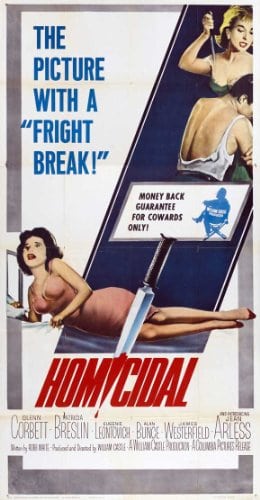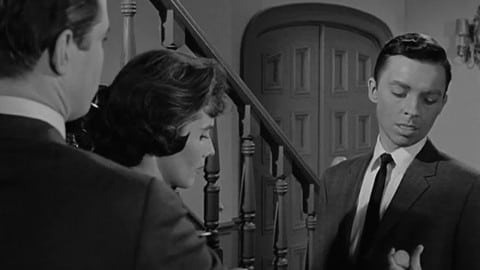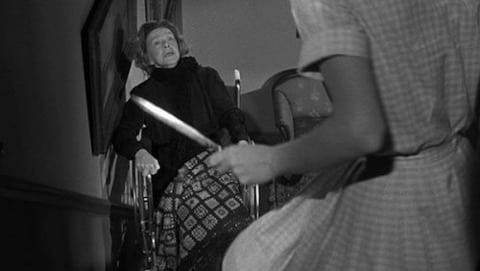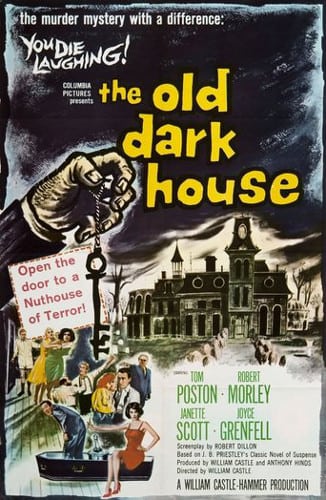Homicidal (1961)
Directed by: William Castle
Written by: Robb White
Starring: Eugenie Leontovich, Glenn Corbett, Joan Marshall, Patricia Breslin
USA
AVAILABLE ON DVD
RUNNING TIME: 83 min
REVIEWED BY: Dr Lenera, Official HCF Critic
A woman calling herself Miriam Webster enters a hotel to be shown to the room she has booked and convinces the bellboy to marry her….as long as she can divorce him immediately afterwards. She wakes up the local justice of the peace to do the ceremony right away, then stabs him to death in the chapel and returns to where she currently lives, a house where she works for a wealthy family and takes care of a mute, invalid old lady called Helga. In fact Miriam Webster is actually the name of a local flower shop owner and the murderous female is called Emily, who lusts after Miriam’s fiancee Karl. Miriam and her brother Warren, who has recently returned from abroad after the death of his last surviving parent, are heirs to Warren’s father’s estate….which is where Emily is working….
In the course of doing my series of Hammer reviews, the cheapest way I could obtain their version of The Old Dark House was to actually buy it in a set of five films from producer/director/screenwriter William Castle, a man known more for the outrageous gimmicks he used to sell his movies than the movies themselves, though The Tingler, The House On Haunted Hill and 13 Ghosts do have a cult following. I hadn’t seen any of his films myself except for Homicidal, though I only vaguely remembered it from what was a sleepy late night viewing, but was keen to see it again. It seems to be generally regarded as one of many Psycho imitations which came out after Alfred Hitchcock’s groundbreaking classic, but it isn’t really that similar. Yes, certain plot points and scenes deliberately recall the earlier film, but Homicidal has enough of its own ideas to be a bit more than a slavish rehash, even if Castle made it as an answer to Hitchcock’s film. Unfortunately, it isn’t anywhere near as good, even if you’re one of those few people who, like me, feel that Psycho, while being a hugely important film, isn’t quite as great as its reputation, if still very good [check out my Psycho review if you want further proof of my madness]. It is, though, a reasonable solid, if somewhat disjointed and messy, thriller with horror elements that certainly maintains the viewer’s interest.
In fact you can’t get too annoyed at Castle copying Hitchcock, as Hitchcock said that Psycho was partially inspired by Castle’s films in the first place and wanted to make something similar, but of a much higher quality. Castle also claimed that Homicidal was partly inspired by a nightmare. It was shot quickly and cheaply [much like Psycho actually] in the California small town environment he usually set his films in. Castle’s gimmick this time was to have something called a Fright Break, where a 45-second timer overlaid the film’s climax while a voice-over advised the audience of the time remaining in which they could leave the theater and receive a full refund if they were too frightened to see the remainder of the film. To ensure the more wily patrons did not simply stay for a second showing and leave during the finale, Castle had different colour tickets printed for each show. When about 1% of patrons still demanded refunds, Castle came up with the Coward’s Corner, where people who couldn’t take the movie were ushered to a corner of the cinema while a recording blasted: “Watch the chicken! Watch him shiver in Coward’s Corner!” , then had to sign a yellow card stating, “I am a bona fide coward.” Homicidal, which lost a few seconds of gore in the UK even for an X’ rating [but now is an uncut ‘12’!], was a commercial success and was even named on Time magazine’s top ten films for that year, a distinction that was not even accorded to Psycho the previous year. Hitchcock was more annoyed when a TV interviewer told him how much he’d enjoyed his film Homicidal.
After an introduction to the film by Castle himself saying how this film is different to his previous ones, a potentially interesting opening has a camera pan out from a calendar photograph and around a room where two children are playing. The boy grabs the girl’s doll, but then the scene ends and I’m not sure whether the film really benefitted from having the scene in it even if it ties in with developments at the end. Then we obviously flash forward quite a few years and Emily, calling herself Miriam Webster, enters a hotel and is shown to her room. The acting of Jean Arless is immediately very good as you immediately notice that something’s “off” with her but it’s quite subtle. She gets the bellboy to agree to marry her, gets the justice of the peace out of bed in the middle of the night to do the honours, then, during the ceremony, pulls a knife out of her bag and stabs the justice of the peace in the stomach in what it’s a really shocking and audacious moment. Castle stages and shoots the scene with little of Hitchcock’s flair, but it’s sheer genius having the killing only fifteen minutes into the film and having the woman attack one of the men. After this, the woman flees and it’s no surprise that we now get some bits which deliberately recall some similar moments of Janet Leigh on the run in Psycho, though of course we cared about her character in that film, who stole a huge amount of money but certainly didn’t kill anyone.
For some time we really are following a psychopath around, something that wasn’t quite new to 1963 audiences but which hadn’t been done that often either, and for a while I wished Homicidal has maintained that point of view, until it got to the climactic revelations which would have made it impossible for the film to do this all the way through. Anyhow, not much really happens now until the film is around three quarters over. We’re fed bits and pieces of background information and there’s a rather creepy atmosphere which is well maintained throughout, while it also seems a distinct possibility that there could be two homicidal maniacs about rather than one. However, while the basic story has all the right ingredients, it’s given to us in a somewhat awkward fashion, while the climax is over even quicker than Psycho’s. It seems that around half of the people who watch Homicidal get the twist really early on and the other half don’t have a clue and are really startled by it. I’d totally forgotten it and didn’t work it out again at all due to excellent acting and makeup work, plus one particular scene which suggests brother and sister incest, something that would have truly shocked 1961 viewers. One thing Homicidal does do better than Psycho is its coda where somebody explains everything for the benefit of the viewer. It feels far less forced and doesn’t talk down to the audience as much.
The opening killing is in fact the only really bloody scene in the film and even the shock moment after the Fright Break is shot in a way that the occurrence is more suggested than shown, but there’s no doubt that Castle was aiming for a more adult audience with this movie, his earlier ones having been tailored more for the teenage drive-in crowd. In fact Homicidal has a rather depressing feel some of the time which doesn’t make it a particularly entertaining example of its kind, though this also makes it a little different from the norm. It could have done with more suspense, but there are some uncomfortably tense moments between Emily and the wheelchair-bound, mute Helga whom she’s supposed to be looking after. Emily torments Helga with all these horrid things she’s done and of course Helga can’t tell anyone, most notably when Emily is prevented from stabbing Helga to death by the arrival of the main detective character in the film and the terrified old lady is desperately striving to tell him what’s happening but can’t.
Castle does copy a few of Hitchcock’s shots of things like staircases, but his direction, while perfectly professional, doesn’t really have much style. While only Arless really stands out and Glenn Corbett is a slightly bland ‘hero’, the acting is generally okay, and having one character dubbed bizarrely adds to the sense of unease rather than detract from it. Somehow Castle got Oscar-winning composer Hugo Friedhofer to score Homicidal and he does it fairly well, adding an element of melancholy to some scenes and enhancing some of the tenser moments, but it doesn’t stick in the mind in any way. Homicidal certainly has some interesting aspects and memorable scenes, but its screenplay really needed a bit of a workover and I did remember it as being better than it was, even if I couldn’t recall many details. Maybe it’ll stick in the mind in some vague fashion again, which would be evidence that it does work, in a way.









Be the first to comment